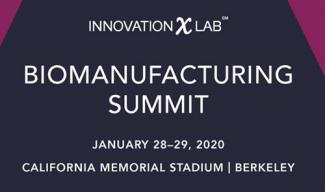NETL representatives hosted a booth and shared information about the Lab’s work this week at the fifth annual U.S. Department of Energy (DOE) InnovationXLab Summit on Biomanufacturing, held Jan. 28-29 in Berkeley, California. The Lab showcased its collaborations in biomanufacturing research and development at the event and shared ideas with other national laboratories and key industry representatives, which supports NETL’s mission to develop technologies to secure and enhance the nation’s energy foundation.
Biomanufacturing involves using biological systems to produce important commercial materials. This includes a wide range of potential research areas, from developing photosynthetic organisms to aid in carbon capture efforts to growing crops like sugarcane and corn to produce fuel for vehicles. Research into using renewable organic materials to meet U.S. energy needs can help reduce dependence on foreign oil through production of biofuels and provide a boost for agricultural and forest industries by turning low-value wastes into high-value fuels, fertilizer or chemicals and electricity.
NETL’s partnerships and collaborations in biomanufacturing focus on exploring the versatility of biomass, which is broadly defined as any organic material or resource that is derived from plant matter and primarily used as fuel. Several NETL projects seek to develop low-cost animal feeds and repurpose byproducts from coal-fired power plants to feed algal biomass for eventual use as fuel.
Additionally, another NETL-partnered project is exploring how to reduce the environmental impact of biofuel-driven power plants. Ethanol, a commonly used biofuel derived from agricultural crops like corn or sugarcane, produces CO2 as a byproduct during processing. One NETL-partnered project is investigating the feasibility of sequestering this CO2 in a large saline reservoir in the Illinois Basin. Research into this area explores the potential market for capturing and storing carbon byproducts from biofuel production from the many ethanol plants in the U.S. with access to geologic storage, which has the potential to greatly reduce atmospheric emissions from biofuel plants.
A major multi-lab effort involving NETL consists of developing a computational model that accurately captures the effects of biomass feedstock variability on reactor performance. Using biomass introduces unique challenges into the energy industry, such as accounting for variable ash, moisture content and other factors, and more research in this area is crucial to overcoming future obstacles in producing energy from renewables. Information gained from the project will help inform and improve future bioenergy technologies.
NETL’s display at the InnovationXLab Summit educated attendees about these and many other groundbreaking collaborations in producing the next generation of biomanufacturing technologies. Exploring biomanufacturing’s potential to produce and enhance renewable sources of power provides environmentally responsible solutions to the challenges of today and secures options for tomorrow.
Hosted by Lawrence Berkeley National Laboratory, the InnovationXLab Summit on Biomanufacturing aims to showcase how U.S. industry can leverage the world-leading bioscience assets and capabilities of DOE’s national laboratories. Its goal is to bridge the gap between research and commercialization and pave the way for a stronger bioeconomy.
NETL is a U.S. Department of Energy national laboratory that produces technological solutions for America’s energy challenges. From developing creative innovations and efficient energy systems that make coal more competitive, to advancing technologies that enhance oil and natural gas extraction and transmission processes, NETL research is providing breakthroughs and discoveries that support domestic energy initiatives, stimulate a growing economy, and improve the health, safety, and security of all Americans. Highly skilled men and women at NETL’s sites in Albany, Oregon; Anchorage, Alaska; Houston, Texas; Morgantown, West Virginia; and Pittsburgh, Pennsylvania conduct a broad range of research activities that support DOE’s mission to advance the national, economic, and energy security of the United States.




